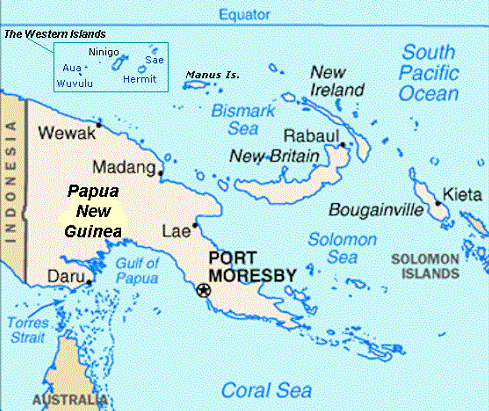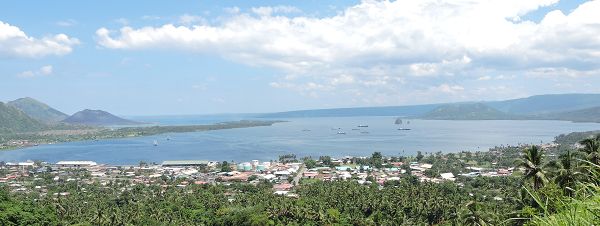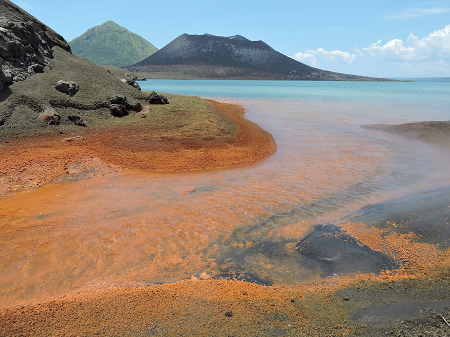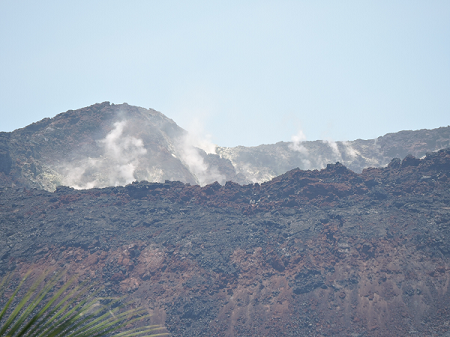THE LESSON OF RABAUL

Rabaul, New Britain Island, Papua New Guinea. The Brits called him George, a Melanesian native of Rabaul born here in 1934. He was 8 years old when the Japanese invaded and seized this island from the Brits – who took it and all of German New Guinea after World War I.
George showed me where the Japanese kept the Australian and British prisoners they captured, all overgrown now. Hidden in the bush, he watched as they were hung or beheaded, and then… eaten. "The officers thought human liver was a delicacy," he said. "The soldiers would cut off pieces of thighs and arms to fry in strips."
I recount George’s eyewitness not to guilt-monger, as I’m aware of how difficult it was for TTPers of Japanese ancestry to read The Lesson of Iwo Jima last week.
It’s the libtards who specialize in guilt-mongering and manipulation, not us. They endlessly try to make us feel guilty over slavery in America that ended 150 years ago, to make us accept some mystical collective tribal guilt even though no American alive today ever owned a slave.
And even if you’re in that small minority of Americans whose great-great grandfather did own slaves, so what? That’s him, not you. You have no responsibility whatever for anything any of your ancestors did, period. What you do have responsibility for is your moral values. Those values, I’m sure, include feeling visceral revulsion towards the enslavement of fellow human beings – much less eating them.
(Unless you’re a Moslem who approves of slavery as it’s sanctioned by Allah in the Koran — why don’t libtards ever denounce Moslems for this?)
The evidence for Japanese cannibalism during WWII is extensive, along with other hideous atrocities such as Hirohito’s mandated policy of taking no prisoners at sea (e.g., machine-gunning sailors in life boats after sinking an American ship), or the sexual enslavement of South Korean girls whom Japanese soldiers were free to rape at will (given the disgusting euphemism "comfort women").
Entire cultures and societies have the capacity to go criminally insane, as do individuals. One of the most recurrent themes in history is barbaric savagery – from the constant blood feuds of primitive tribes to the Mongols of Genghiz Khan to the Reformation’s Thirty Years War to Stalin’s genocidal murder of millions of Ukrainians and Hitler’s of Jews.
There is a famous scene in the movie classic The African Queen, when Bogart tells Hepburn such savagery is "natural" – and Hepburn responds that "Nature is what we were put here on earth to rise above."
Christianity offers a way to do this for individuals – but how can an entire culture, an entire people rise above their past?
This involves at least two necessary conditions. First is to face up (or man up if your prefer) to the past – to its reality and the responsibility of those who committed it, rather than denying either. Second is to refuse to guilt-wallow, to reject attempts by psychological or political con-artists to feeling guilty over ancestral acts that current generations did not commit.
If you do the first, doing the second is far easier. Germany’s leaders and Germans in general have faced up to the Holocaust. As a result, they are difficult to manipulate as Greece’s leaders are trying to do by waving a begging bowl demanding "reparations."
You can’t even imagine Angela Merkel caught in a private conversation saying the Holocaust never happened. What then, are we to think when Japan’s Prime Minister Shinzo Abe publicly denies wartime sexual slavery ("comfort women")?
Japanese historian Yoshiaki Yoshimi has located archives in Japan’s National Institute for Defense Studies providing undeniable evidence that over 200,000 women – mostly from Korea and China, but also the Philippines, Burma and elsewhere – were sexually enslaved in brothels for Japanese soldiers during WWII.
There are innumerable confessions and testimonies confirming his research. So what good does it do for Japanese leaders to deny the truth?
Another Japanese historian, Yuki Tanaka, has provided a scholar’s accounting of atrocities in his book: Hidden Horrors: Japanese War Crimes in World War II. It is grisly reading.
Tanaka recounts the slaughter of 2,500 Australian and British POWs at Sandakan, British North Borneo (now Sabah, Malaysia), the hideous biological warfare and vivisection experiments of Shiro Ishii’s Unit 731, countless other atrocities that will turn your stomach, and over 100 documented accounts of cannibalism.
Here’s a discussion of Tanaka’s book in The Times of India, another in The London Independent. The evidence is overwhelming, yet large numbers of Japanese today remain in passionate denial. Angelina Jolie’s marvelous movie Unbroken, about real-life WWII hero Louis Zamperini, is being boycotted in Japan because the book on which it’s based recounts cannibalism by Japanese soldiers.
Being eaten was almost the fate of a American pilot shot down over Chichi Jima island in September 1944. He escaped but eight others in his crew were captured and executed – with four butchered, their livers and thigh meat cooked and served to the officers, including Lt. Gen Yoshio Tachibana, subsequently hung for war crimes.
To this day, the surviving pilot bitterly recounts his escaping "becoming a Japanese hors d’oeurves" like his fellows. If he had, he’d have never become the 41st President of the United States, George H. W. Bush. The story is told here in The London Telegraph.
Some of Tanaka’s cannibalism accounts are from here in Rabaul. Luckily for America’s greatest fighter pilot ace, Pappy Boyington, he didn’t become one of them when he was shot down in January 1944 just after downing his 26th Zero. He ended up in a Japanese POW camp with Louis Zamperini.
I mention Pappy because during the 1950s he became a good friend of my father’s, and was often over at our home when I was a boy. He was soft-spoken and always kind to me, insisting I call him "Pappy," and not "Col. Boyington." It was from him I first heard of Rabaul.
"It’s one of the best protected harbors in the Pacific, certainly one of the prettiest," he told me. "So good that Yamamoto [Admiral Isoruku Yamamoto, architect of bombing Pearl Harbor] had his headquarters there, planning to launch an invasion of Australia. But we spoiled those plans after we broke his code. When his plane left Rabaul [April 18, 1943] for an island called Bougainville, a bunch of my buddies in P-38s knew just where he was headed and blasted him out of the sky."
I’ve wanted to come here ever since. It’s a good place to reflect on the lessons of history. The first is the combination of beauty and danger. Here’s a pic of Rabaul harbor, and you can see what Pappy was talking about:

See that hill on the right side of the harbor entrance? That’s a volcano called Vulcan. See that black hill way across from it on the left? That’s a volcano called Tavurvur. Both of them simultaneously erupted on the same day in 1994, covering Rabaul in ash. It’s barely recovered to this day.
To the left of Tavurvur is another volcano and the slope of a third. In fact, the horizon behind Vulcan all the way around to where I’m standing, continuing to encompass Tavurvur’s neighbors, is the rim of a supervolcano – the harbor is it’s sunken caldera. Tavurvur is very much alive and smoking – starkly beautiful and dangerous:


History can be like this – beautiful and peaceful, then without warning it explodes in violent destruction. The lesson then is how to overcome, rebuild, and to avert its repetition.
The Germans have done a good job at this. Have the Japanese? In many ways, yes. They are a democratic people with a great many freedoms, and an ally of America, a very important one in regard to Chicom China. They are genuinely not the same people who committed the inhuman atrocities of World War II – and they have every right to be proud of being so.
But that’s the catch. How can they be proud of overcoming what they deny ever happened?
Far too many Japanese schoolchildren learned their country’s war history from textbooks that taught, in sum: Japan was a peace-loving country when suddenly America began bombing its cities for no reason then nuked Hiroshima and Nagasaki. Pearl Harbor? That was in self-defense for the American oil embargo. What atrocities? All lies, never happened.
This does very grave danger to Japan and its people. Japan today is dying, literally. Japan is a country of old people, not young. Its population is getting progressively older (oldest in the world now) while married couples refuse to have children. With immigration of foreigners abhorrent (the word for "foreigner," gaijin, really should be translated as the N-word, as it’s deeply pejorative), Japan is falling off a demographic cliff.
At the same time, it faces a gigantic ruthless enemy right across the western horizon who hates its guts. They desperately need all the friends they can get, most especially their neighbors. Unfortunately, those neighbors have bitter memories of what Japan will not admit to.
There are exceptions. Burma was brutalized, but from what I could see, Burmese have forgiven – they welcome Japanese visitors and business today. Taiwan was a Japanese colony for 40 years (1905-1945), yet relations are cooperative and warm.
To varying degrees, it’s different with the Philippines, Vietnam, Malaysia, Thailand, Indonesia, and above all, South Korea. If Japan is to have a future, it must heal the past with their neighbors.
Ultimately, this will have to include China itself – but that cannot happen until China is no longer Chicom. With no Chinese believing in Communism any more, the Chicoms have resorted to rabid jingoistic nationalism as a unifying rationale for retaining their monopoly of power. Their most convenient target of choice is the Rapists of Nanking.
You have no idea how much guilt-mongering Japan-hatred is flooding China now. It cannot be combated or defused or deflected by political aikido by living along an Egyptian river of denial. This makes it Peking Duck soup to portray the Japanese people of today as no different from those of 70-80 years ago.
The great majority of Japanese are different from their grandparents or great-grandparents. Yes, it’s difficult to admit they were war criminals and inhuman monsters, but life is filled with challenges and what counts is how you respond to them.
Japanese are a vastly more moral people today. To have a future they need to be proud of that. Let’s hope they can be, by facing their past. It’s the lesson of Rabaul.

